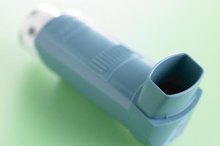What does fact checked mean?
At Healthfully, we strive to deliver objective content that is accurate and up-to-date. Our team periodically reviews articles in order to ensure content quality. The sources cited below consist of evidence from peer-reviewed journals, prominent medical organizations, academic associations, and government data.
- PubMed.gov: Pseudoephedrine: effects on milk production in women and estimation of infant exposure via breastmilk
- PubMed.gov: Pseudoephedrine: effects on milk production in women and estimation of infant exposure via breastmilk
The information contained on this site is for informational purposes only, and should not be used as a substitute for the advice of a professional health care provider. Please check with the appropriate physician regarding health questions and concerns. Although we strive to deliver accurate and up-to-date information, no guarantee to that effect is made.
Sudafed and Milk Production for Breastfeeding
Sudafed, a brand name of pseudoephedrine hydrochloride, is an over-the-counter medication used to remedy sinus or nasal congestion. Women who are breastfeeding should always consult a health-care professional before using any medication. As with any medication, Sudafed has the potential to affect the breast milk and the breastfeeding baby 2.
Evidence of Impact
Results from a study published in the "British Journal of Clinical Pharmacology" indicate that a single dose of pseudoephedrine significantly reduces milk production. When breastfeeding has been well established, a single dose of Sudafed may not terminally affect the milk supply 2. A professional lactation consultant can assist a mother in rebuilding a healthy milk supply if the drug seems to stop milk production. Pumping with a breast pump after each feeding, nursing the baby frequently and even the use of some breast milk teas or herbs can give the milk supply a boost following Sudafed use.
- Results from a study published in the "British Journal of Clinical Pharmacology" indicate that a single dose of pseudoephedrine significantly reduces milk production.
- Pumping with a breast pump after each feeding, nursing the baby frequently and even the use of some breast milk teas or herbs can give the milk supply a boost following Sudafed use.
Drug Effects on Infant.
Albuterol & Breastfeeding
Learn More
Using Sudafed can directly impact the infant. There is a risk that the infant will experience the same effects as the mother. When Sudafed is taken, the mother experiences a decreased sense of congestion due to the reduced inflammation of the nasal passages and sinus cavities. How this impacts the infant is not exactly known, but the potential for similar, unnecessary, reactions exists. Despite the potential for this to occur, Sudafed is described as generally safe when used infrequently.
- Using Sudafed can directly impact the infant.
- How this impacts the infant is not exactly known, but the potential for similar, unnecessary, reactions exists.
Result of Decreased Milk Supply
There is a risk that the infant will be hungry after feeding sessions due to the reduced milk supply. This can cause fussiness, sleep disruption and even weight loss or failure to gain weight with continued Sudafed use. Kellymom.com explains that chronic use of Sudafed can discontinue milk production entirely.
Off-Label Use
What Will Happen If I Take 5 Hour Energy While Nursing?
Learn More
Sudafed can be used in a manner other than how it is intended, called off-label use, to diminish milk supply. The necessity of drug use to stop lactation is rare, but under health-care provider supervision, Sudafed may be useful in this situation.
Related Articles
References
- PubMed.gov: Pseudoephedrine: effects on milk production in women and estimation of infant exposure via breastmilk
- eMedTV.com: Sudafed and Breastfeeding
- AAFP: Medications in the Breast-feeding mother
- Dobkin C, Nicosia N. The War on Drugs: Methamphetamine, Public Health, and Crime. American Economic Review. 2009;99(1):324-349. doi:10.1257/aer.99.1.324
- Eccles R. Substitution of phenylephrine for pseudoephedrine as a nasal decongeststant. An illogical way to control methamphetamine abuse. Br J Clin Pharmacol. 2007;63(1):10–14. doi:10.1111/j.1365-2125.2006.02833.x
- Deckx L, Sutter AID, Guo L, Mir NA, Driel MLV. Nasal decongestants in monotherapy for the common cold. Cochrane Database of Systematic Reviews. 2016. doi:10.1002/14651858.cd009612.pub2
- Laccourreye O, Werner A, Giroud J-P, Couloigner V, Bonfils P, Bondon-Guitton E. Benefits, limits and danger of ephedrine and pseudoephedrine as nasal decongestants. European Annals of Otorhinolaryngology, Head and Neck Diseases. 2015;132(1):31-34. doi:10.1016/j.anorl.2014.11.001
- "Products/Sudafed Nasal Decongestant." Sudafed & Sudafed PE. 2005. Pfizer Inc. 22 Jan 2007.
- NHS Choices.Decongestants. (2016, March 03).
Writer Bio
Sarah Harding has written stacks of research articles dating back to 2000. She has consulted in various settings and taught courses focused on psychology. Her work has been published by ParentDish, Atkins and other clients. Harding holds a Master of Science in psychology from Capella University and is completing several certificates through the Childbirth and Postpartum Professional Association.









